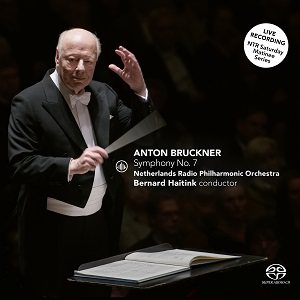Am 6. September 2019 beendete der damals 90-jährige Bernhard Haitink seine musikalische Karriere mit einem Konzert in Luzern. Wenige Monate zuvor dirigierte er im Concertgebouw in Amsterdam Bruckners Siebte Symphonie an der Spitze des Netherlands Radio Philharmonic, jenem Orchester, mit dem er 1954 seine Karriere begonnen hatte und dessen Chefdirigent er 1957 wurde. Es war sein letztes Konzert in Amsterdam.
Bruckners Siebte war gewissermaßen Haitinks letzte Botschaft an die Musikwelt. Sie stand im Mittelpunkt vieler Konzerte des Jahres 2019. Er schöpft dabei aus seiner langen Erfahrung, und das äußert sich in einer Interpretation, die seinen seit jeher bekannten Sinn für Klangbalance und sein Gespür für Transparenz zeigt.
Geschmeidigkeit und Lyrik kennzeichnen diese sehr schöne Version der Symphonie. Haitink bringt die Melodien und die Farben zur Geltung. Ein vergeistigtes Allegro Moderato und ein schönes Adagio führen zu einem eigenartig schwingenden, gemächlich tanzenden, aber auch kräftig akzentuierten und sehr farbigen Scherzo.
Doch der letzte Satz ist die Krönung des Ganzen. Es ist faszinierend, was Haitink hier an Detailarbeit leistet, wie er strukturiert, Tonebenen einteilt, dabei eine schier unglaubliche Transparenz erreicht, feinste Abstufungen realisiert und jenen Grad der Loslösung vom Material erreicht, der nur dann zustande kommen kann, wenn ein Dirigent bis in den Kern der Musik vorgedrungen ist und gleichzeitig über ihr steht.
In diesem Finale merkt man besonders gut, wie bei Haitink die Erkenntnisse einer Jahrzehnte langen Beschäftigung mit Bruckner zu einem einerseits objektiven, andererseits sehr souveränen Spätstil zusammenfließen. Er erreicht so ein Maximum dessen, was man an Expressivität und Formgefühl aus dieser Musik herausholen kann.
On September 6, 2019, the then 90-year-old Bernhard Haitink ended his musical career with a concert in Lucerne. A few months earlier, he had conducted Bruckner’s Seventh Symphony at the Concertgebouw in Amsterdam with the Netherlands Radio Philharmonic, the orchestra with which he had begun his career in 1954 and of which he became principal conductor in 1957. It was his last concert in Amsterdam.
Bruckner’s Seventh was, in a sense, Haitink’s last message to the music world. It was the focus of many concerts in 2019.
In this work he draws on his long experience, and this is expressed in an interpretation that shows his sense of tonal balance and his flair for transparency.
Suppleness and lyricism characterize this very fine version of the symphony. Haitink brings out the melodies and the colors. A spiritualized Allegro Moderato, a beautiful Adagio lead to a strangely swinging, leisurely dancing, but also powerfully accented and very colorful Scherzo.
But the last movement is the crowning of the whole. It is fascinating what Haitink achieves here in terms of detail, how he structures and differentiates tonal levels, achieves an almost unbelievable transparency, realizes the finest gradations and finally gets to that degree of detachment from the material that can only be obtained when a conductor has penetrated to the core of the music and at the same time stands above it.
In this finale one notices particularly well how in Haitink’s case the insights of decades of study of Bruckner flow together into a late style that is on the one hand objective and on the other very sovereign. He thus achieves a maximum of what one can get out of this music in terms of expressivity and sense of form.




















